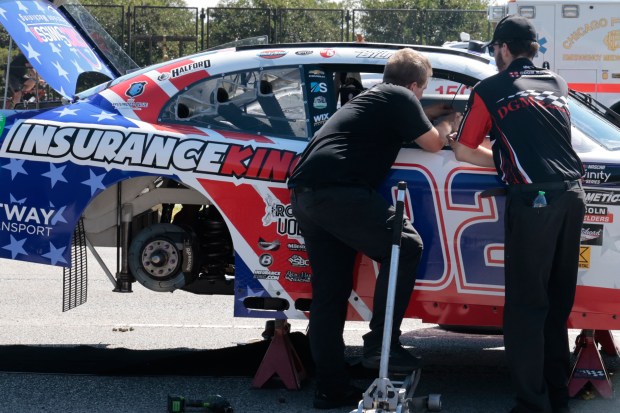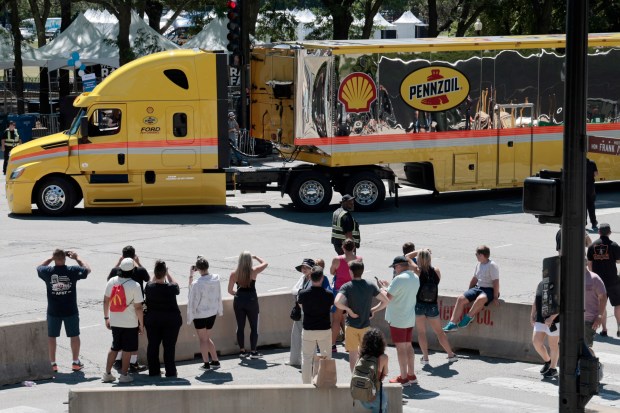Just before the green flag went up last July, Chicago’s first NASCAR race through Grant Park seemed all but doomed.
Criticism over closed streets and park privatization mounted for months. Canadian wildfire smoke lingered. Lightning canceled concerts and halted an undercard race. And as the backend of a record rain spell drenched drivers walking to the main event’s start, even the professionals wondered aloud if the race would ever happen.
But the skies cleared, and all that noise — at least inside the race grounds — faded behind the sounds of car engines roaring down Columbus Drive.
By the time the race ended, around 4.8 million viewers had tuned in to see New Zealand’s Shane van Gisbergen win NASCAR’s first city street race in his first NASCAR start. The three-hour spectacle of stock cars hurtling past Chicago’s sunset skyline became NBC’s most-watched Cup Series competition in six years.
Weekend forecasts predict the first go’s torrential downpours will be replaced this weekend by the sort of sunny, warm weather that makes Chicago a top spot for vacationers.
That doesn’t mean NASCAR is now universally welcomed to the lakefront. Kristin Enola Gilbert, co-owner of the Exile in Bookville bookstore in the Michigan Avenue Fine Arts Building, said she will have to shut down again on what would be one of the busiest weekends of the year.
“The city is just going to do what they want,“ Enola Gilbert said. “It’s something we just kind of have to accept.”
Still, NASCAR Chicago Street Race President Julie Giese said people and businesses downtown now have a better deal and a better understanding of what to expect.
“It was that unknown,” Giese said Friday. “Now everyone has a really good understanding of the event.”
Race organizers have made changes aimed at ameliorating the pushback from Loop residents who decried its disruptions. Cuts to set-up and teardown times this year mean six fewer days of street closures, Giese said.
In a bid to make the race more accessible, a public “NASCAR village” with neighborhood restaurants has been expanded and ticket prices for children 12 and under have been dropped to free on Saturday and $45 on Sunday, far below the $150 single-day and $269 weekend-long general admission cost.
And in addition to big-name concerts from Keith Urban, the Black Keys, Lauren Alaina and the Chainsmokers, the event’s entertainment will include local flair with Chicago blues legend Buddy Guy and a house music showcase.
NASCAR has also sweetened the pot for the city. The organization agreed to pay Chicago $2 million to cover police overtime and other expenses associated with the event. That money comes in addition to a $550,000 park permit fee, $2 for each of the estimated 50,000 tickets sold and a commission on food, drinks and merchandise.
Last year, the city’s share was $620,000. But the event cost the city at least $3.5 million for police overtime and construction. Some of those expenses will not occur again, such as engineering fees that helped transform streets surrounding Grant Park into a 12-turn, 2.2-mile track.

Race organizers tout an economic impact report that determined the event drew $8.3 million in state and local taxes and a total economic impact of $109 million. NASCAR believes that number will increase after the success of last year’s race, named by the Sports Business Journal as the “Event of the Year.”
NASCAR reported spending around $50 million on the 2023 race, and said the investment generated an estimated $24 million in media value from the exposure Chicago received.
But while downtown Ald. Bill Conway, 34th, is confident Chicago will once again “shine on the world stage” on air, he is not as sure about the rosy economic picture painted by race organizers. He called the report “not fully comprehensive” and wondered how much of the reported local spending was actually tied to a volleyball tournament held nearby the same weekend.
Conway and other downtown aldermen surveyed residents on the event, he said Friday.
“They said, ‘NASCAR was a bit of a pain for us, but it wasn’t as bad as we thought it would be,’” Conway said.
People who live in the area overwhelmingly requested the event take place on a weekend that did not conflict with the Fourth of July holiday, he said. However, that request seemed to go unheard when Mayor Brandon Johnson’s administration announced the race would return for a second year just as the economic impact study became public in early October.
Conway praised NASCAR’s community outreach efforts and added that “people know what’s coming, which helps.” But he plans to continue to push for the event to change weekends if it keeps coming back to Chicago.
“Families would like to be able to use the park that is outside their front door on the holiday weekend,” he said.
The repeat of the race has drawn varied reactions from downtown businesses. The Chicago Loop Alliance business group is “very supportive” of the race, “a great showcase of the city of Chicago,” spokesperson Ariella Gibson said.
Gibson praised race organizers for “working pretty diligently” to make sure Loop residents were alerted about everything from street closures to the weekend’s alternate dog park.
“It does create some difficulties, but the outcome or the positive aspects of it outweigh those cons,” she said.
Gibson conceded downtown businesses have “mixed opinions” on the event, with Exile in Bookville not the only one closing during the races.
Enola Gilbert said she would be happy to close the store if she knew the race was for “the common good.”
“But I just don’t see that revenue, and I don’t see the greater good,” she said. “It’s hard enough to be a small business. Having to make that decision to close and lose income, it’s very unfortunate.”
More businesses, such as the Studebaker Theater in her building, will also be shuttered, she said. Other big Grant Park events, including Lollapalooza, do not lead to as many closures, she added.
Enola Gilbert had vocally opposed the race before and after the event last year in hopes doing so would nudge city leaders to exercise their option to not host it a second time. Hearing the event would occur again with little input was dispiriting, she said.
But at least one person is excited for the race without reservation. Van Gisbergen, whose outside-of-America racing style lends itself well to the twisty course, brought his family to Chicago for the weekend.
“It’s ridiculous to think in a city this size you can have a race like this,” the reigning champ told the Tribune Friday. “You feel even more than last year the buzz around. It’s pretty cool to have it here.”
jsheridan@chicagotribune.com



